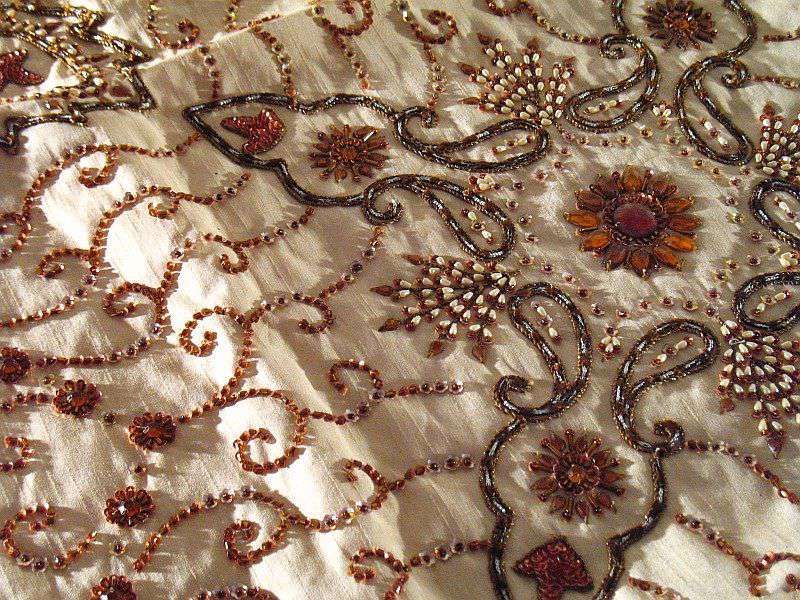===
0096,
7
===

=== |
 |
mastuurii ;xuub-ruu))ii dono;N nah jam((a hove;N
;xuubii kaa kaam kis kii i:zhaar tak
nah pahu;Nchaa
1a) veiledness, fine appearance-- would not both be collected/gathered [together]?
1b) veiledness, fine appearance-- may both not be collected/gathered [together]!
1c) veiledness, fine appearance-- both might/would not be collected/gathered [together]
2) the work/desire of whose excellence/fineness didn't arrive as far as expression?
mastuurii : 'The state of being veiled, &c.; concealment; retirement; —chastity; modesty'. (Platts p.1033)
ruu : 'Face, countenance; appearance, aspect; surface (of the earth, &c.); sake; cause, reason; colour, pretence'. (Platts p.702)
i:zhaar : 'Manifestation, revelation, disclosure, demonstration, publication, display, declaration; statement, declaration in a court of justice or before police officers; information; examination of a witness, deposition, evidence, written testimony'. (Platts p.60)
FWP:
SETS == A,B; EXCLAMATION; GENERATORS; POETRY
MOTIFS == VEIL
NAMES
TERMS == INSHA'IYAH; VERSE-SETThis verse is marked as the beginning of a verse-set. The endings of verse-sets are never marked, but since the ghazal is only nine verses long, and since verse-sets are rarely less than three verses long, probably we're to consider that this verse-set includes the rest of the ghazal. In that case, what is it that really unites the verses? SRF doesn't even mention their status as a verse-set, and indeed they're all quite capable of standing on their own (unlike some verses in other verse-sets).
Perhaps this verse should be seen as setting up a tension between (inner) excellence and (outer) manifestation-- so that then
{96,8}
laments the fact that beauty always does end up in the bazaar (an undesirable form of outer manifestation), while
{96,9}
laments the fact that would-be martyrs to passion often don't end up with the death (a desirable form of outer manifestation) that they crave.
On the other hand, {98,8} is marked as a verse-set, and that whole ghazal is only 9 verses long, so it's clear that in the present ghazal we could be meant to take only this verse and the following one as constituting the verse-set. These two verses have much more in common with each other anyway than they do with {96,9}, so I vote for a short, two-verse verse-set.
But how spectacularly Ghalibian the present verse is! It's insha'iyah to the maximum possible degree, with a future subjunctive first line and an interrogative second line. Then of course it's an 'A,B' verse, in which the two lines are semantically quite independent and it's left for us to decide how to put them together.
When we look at the first line, every part of it is cleverly and wickedly ambiguous. Both mastuurii and ;xuub-ruu))ii are qualities that we at once associated with the beloved-- she might well be both 'veiled' and 'attractive, fine-faced'. But the interpretive possibilities might also be wider: either a lover or a poet might well have qualities of 'veiledness, concealment' and 'good-aspect-ness, good appearance' (see the definitions above).
Then, what do we make of the second half of the first line? I've presented in my translation three very solid and grammatically well-founded possibilities. It could be a genuine question (1a), a request for information-- 'Wouldn't we expect these two fine qualities to appear together, or have I got it wrong?'. Or it could be an expression of fear (1b)-- 'God forbid that these two (seemingly) contradictory virtues should be yoked together!' (because they would interfere with other; or else because they would double each other's effect). Or it could be a statement (1c): these two contradictory qualities-- one based on withholding oneself, and the other based on showing oneself-- in fact would not be likely to appear together. With such radically open possibilities, we have no choice but to turn to the second line for clarification.
And do we get it? Of course not. This is Mir doing Ghalibian tricks (though they are also his own of course). (Or else, as SRF would say, these are the kind of tricks that Ghalib might well have learned from Mir.) We get a question that could perfectly well be either straightforward (a genuine request for information) or else rhetorical (a sneer at the absurdity of the very idea that excellence wouldn't arrive at expression).
In addition, the question in the second line almost ties itself in knots trying to keep a variety of possibilities open. First we have ;xuubii -- is that meant to be identified with the ;xuub-ruu))ii in the first line, or somehow contrasted with it? Then we have the wonderfully wide-ranging kaam , which can mean either 'work' or 'desire' (for more on this see {7,1}). And as SRF notes, i:zhaar can mean anything from 'manifestation' to 'disclosure' to 'statement'-- all of which have their several kinds of relevance.
In short, both lines could be about the beloved, and the chances that her combination (or non-combination) of veiledness and beauty might be manifest in the world, or in poetry. Or both lines could be about the poet/lover, and the chances that his combination (or non-combination) of concealment and 'fine appearance/aspect' (of poetic or personal excellence) would lead to manifestation of his talent and/or 'publication' (in the sense of 'making public') of his poetry. Or the first line could be about the beloved's qualities, and the second about the poet/lover's attempt to capture them in his work. It's a real 'meaning machine'; it's a glorious smorgasbord of choices, fully equal to fine Ghalibian fare. Dig in, try different sauces on different dishes, serve them up in different tones, and admire the power of fifteen words to mess with our minds.
Compare an equally clever verse in which Ghalib juxtaposes pairs of attributes:
G{4,4}
The present verse is a meditation on the seeming failure or futility-- or at least, problematicalness-- of beauty that remains veiled from sight. Then the second verse of the verse-set,
{96,8},
is a meditation on the difficulties faced by beauty that is unveiled and visible to all.